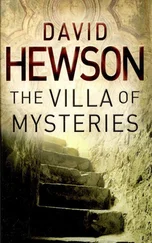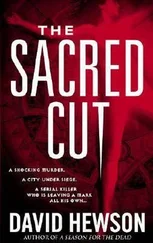She sighed and glanced at the line of cedars separating them from the pale brick perimeter wall and the lagoon. The trees rustled in the growing breeze stirred by the coming change in the season.
“Sometimes I did. Not often. Mostly I felt nothing. Nothing at all. I was the woman. I had to sit there listening to Michele dream up his ridiculous, harebrained schemes to make us rich again. I had to watch Gabriele turn out glass that would never sell when, with a few changes, with an ear that listened to the outside world, we could have made a little money at least.”
“Michele thought that was the job of the capo .”
“Quite! And a woman’s never going to fill those shoes, is she?”
“I’m sorry.” Falcone was genuinely shocked. “I rather imagined there were simpler issues here.”
He hesitated to go on but the bafflement in her face made it impossible to remain silent.
“I wondered if Bella was Massiter’s only conquest in the household. Whether perhaps jealousy was involved.”
She laughed out loud, then let her face fall in her hands. When she returned to look at him there were tears in her eyes, tears of mirth and amazement.
“You thought I would sleep with that creature, Leo? Oh my . . . How could you be so blind? And you’re such an observant man in so many other matters! You really do astonish me sometimes.”
Yet it had been easy to be blind. There had been a small fire of jealousy sparking the condition. Leo Falcone understood that. Feelings complicated everything, and had done throughout.
“I’ve never slept with anyone,” she said. “I’m a forty-seven-year-old virgin who has spent her entire life chastely wed to a single belief. That the Arcangeli are the greatest glassmakers in the world, and we must simply wait, like insects trapped in amber, until the rest of you come around to acknowledging that fact. Which was never going to happen, and none of them realised it but me. Whatever Hugo Massiter offered us for the island . . .”—her brown eyes suddenly blazed at him—“ . . . we would take. I wasn’t going to see that last opportunity go to waste. Certainly not over a little slut like Bella, who’d sleep with anything, then call back with her price afterwards.”
“She told you about the pregnancy?”
“Of course she did! Are you listening to a single word I say? I was the menial. The servant who washed and cooked and cleaned, while Bella put in her hour or two in the furnace every other night and slept her way round Venice the rest of the time. She told me because it didn’t matter . All that pressure she was putting on Massiter. Threatening to bring the sale down around his head. She believed Michele’s dreams, that Massiter needed us more than we needed him. The woman was too stupid to understand that what she was really jeopardising was our own future.”
“You could have convinced her.”
“You’re still not listening,” she replied with a sudden unexpected bitterness. “Servants convince no one. If Bella had died as she should, we would all have been better off. As it was . . . Yes! I sent Bracci that note and the keys. I expected he’d make a fool of himself in public, nothing more, and if he took the blame, so be it. Or it could be Massiter, if Nic wished to persist with his obsession. Provided we had his money first.”
She peered at the grave, with its fresh earth and the raw headstone with the newly carved name. “When she came back to the house, I killed her. Then I went to bed and slept. What else was there to do? Poor Uriel never could get anything right. He was always walking into the wrong room, picking up the wrong piece of equipment. I saved him so many times. I couldn’t be there every minute of the day.”
She put out a slender hand to the white marble and traced his name with a long index finger.
“Do they haunt me?” she asked. “Not anymore. Life is a series of decisions. Some good. Some bad. Most irreversible. I’m not going to look back, Leo. There’s nothing there to see. Uriel’s death was a tragic accident. The rest of them were criminals of a kind, with no great fondness for humanity. My main regret . . .”—her hand moved away from the headstone, and stretched out to touch his own—“ . . . is what happened to you. It was so undeserved, and for such a selfless act. I regret that bitterly. When I saw the state Bracci was in, that he had the weapon, I tried to stop him. You saw what happened.”
Her fingers tightened on his hand, her eyes peered into his.
“And you tried to protect me, Leo. I told you how desperately sorry I was so many times in that hospital. When I looked at you and didn’t know whether I’d ever see that spark in your face again. Now that could have broken me. Nothing else. I almost resented that, you know. I thought I was too old and too worn down to be touched by anything. You proved me wrong.”
He shook his head. “And all the broken lives?” he asked.
“Which ones?” she replied quickly. “Mine? My brothers’? Bracci’s, for God’s sake? Don’t presume to judge there. What about the lives you and your stubbornness have broken? Young Nic, who put his relationship with that lovely American in jeopardy because he thought something you valued, some distant, hazy notion of justice, was more precious than a simple human emotion like love? And you? Doesn’t it seem somewhat ironic that my only real regret in all this concerns what happened to you? And that is the very last thing on your own mind?”
“I do what I do!”
She stood up and pulled his jacket collar more tightly over his shirt. The wind was rising. The evening was closing in. Cold nights were surely on the way, weeks before their time.
“So what happens now, Inspector Falcone?” she demanded. “You have a woman here who is willing to look after you for a while, and God knows you’re a man who needs caring for. Shouldn’t we both be a little selfish for once?”
“This isn’t about you or me. It’s about the law . . .”
“Damn the law! What law stopped Hugo Massiter being what he was? What law do all those bent politicians and crooked policemen feel they’re beholden to? Play the martyr if you must, but at least find a better cause than that.”
He felt lost for words. Tired, too. That happened a lot lately. He was an invalid, however much he fought the idea.
She took out her mobile phone. “I’ll have to call for one of those taxi thieves now. It’s just as well I have a little money at last.”
“We haven’t finished!” he objected.
Raffaella looked at him, her face full of sympathy and affection. Leo Falcone felt lost. Venice was, he realised, beyond him, and always had been. It was simply his own arrogance that had tried to persuade him otherwise.
“As far as this matter’s concerned, we have, Leo,” she said firmly. “I’m taking you back to the hospital now. Next week we will begin to make arrangements for moving you to Rome. I hope you’ll want me to come, but that’s entirely up to you.”
“Get me out of here sooner,” he said, almost without thinking. “I’ve had enough of this place.”
She smiled, then, before he could object, leaned down and kissed his cheek. Leo Falcone felt her soft lips brush against his skin, damp, warm, inviting, and tried to remember how long it had been since he’d been embraced by a woman.
“You’re not alone in that,” she said. “But this is finished, Leo. What we’ve discussed here I will never talk about again. Never, do you understand? The world is for the living, not the dead.”
“But . . .”
A single slender finger came and fell upon his lips. “But nothing. That is the arrangement. Should you break it . . . should you be so rash as to drag me into a police station someday and try to raise these matters again, I will, I swear, do something you’ll come to regret.”
Читать дальше












